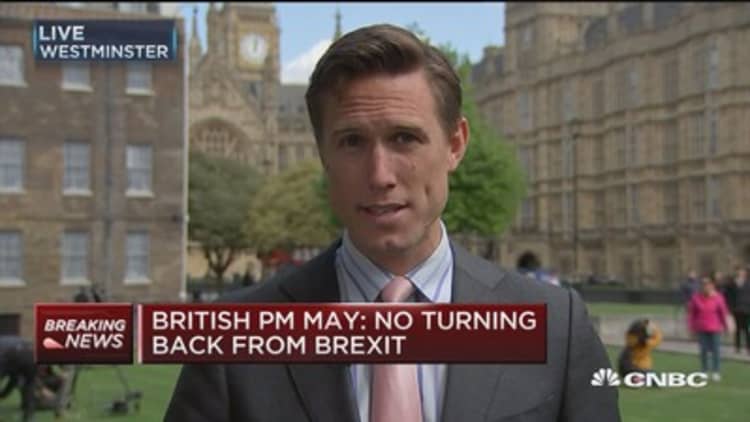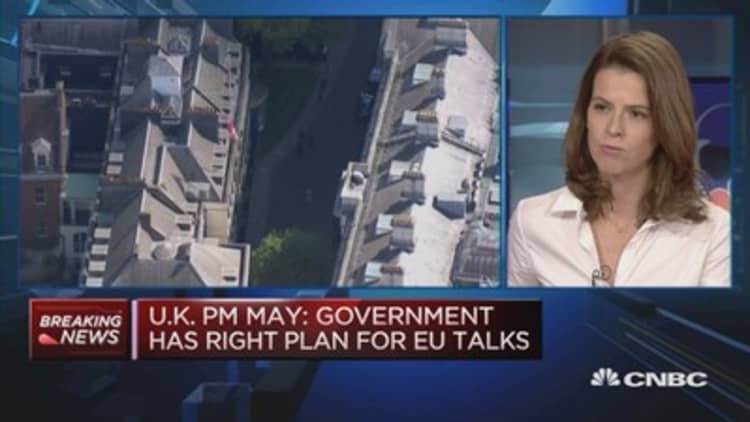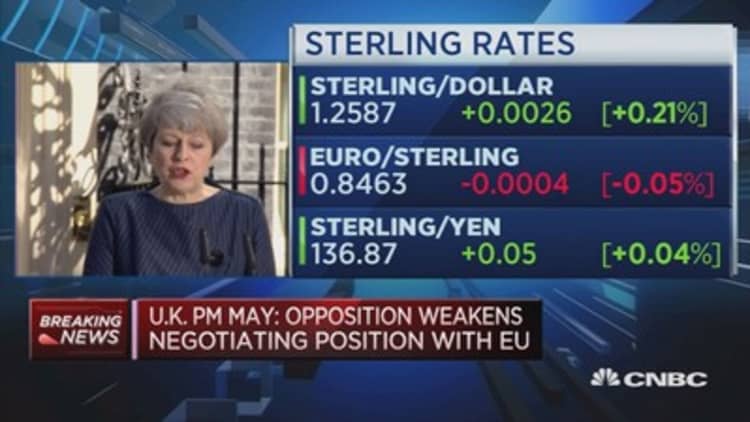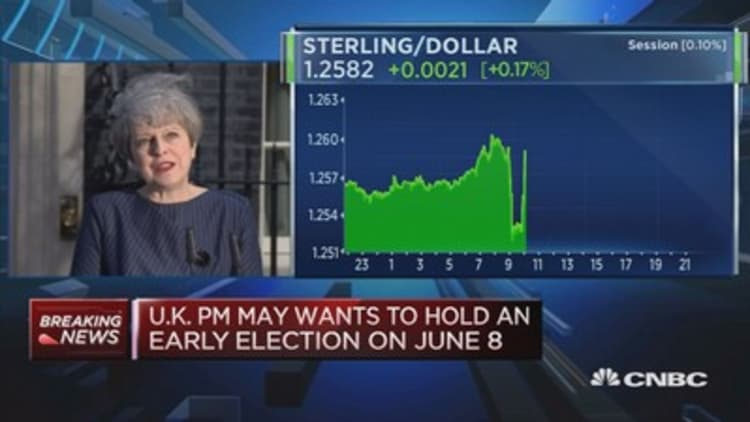
British Prime Minister Theresa May "reluctantly" announced a snap general election on Tuesday, blaming divisions within Parliament over Brexit as the impetus behind her abrupt reversal of position.
"I have concluded the only way to guarantee certainty and security for years ahead is to hold this election and seek your support for the decisions I must take," declared the prime minister upon revealing that the country will vote on June 8, provided a motion proposing early elections to be tabled to lawmakers Wednesday receives the necessary two-thirds majority support.
May's decision represents a sharp backtrack from her position until now, which had been that holding an election before 2020 would be an unnecessary distraction from the monumental task of successfully navigating an exit for the U.K. from the European Union.
"The country is coming together, but Westminster is not," she said, adding that "division in Westminster will risk our ability to make a success of Brexit."

Proceed with more legitimacy?
Should the Conservative party emerge victorious in June's general election, some commentators have observed that May's push towards a so-called "hard Brexit" will proceed with more legitimacy and most likely less political friction.
However, this is not clear cut, says Jonathan Loynes, chief economist at Capital Economics.
"For a start, May (originally a 'remainer', don't forget) has sounded fairly conciliatory on some aspects of Brexit such as immigration in the early exchanges with the EU. And if the election does trigger (Jeremy) Corbyn's replacement as Labour leader, that might lead to more effective domestic opposition to the government's Brexit vision," he said in a note to clients on Tuesday, pointing to sterling having recovered all of the losses taken on Tuesday morning prior to the announcement.
George Buckley, co-head of European economics at Nomura, agreed with the potential for different implications depending on the election result.
"An election which gives Mrs May a more sizable majority would reinforce her negotiating strategy and give the government a more solid mandate to deliver an agreement that it sees fit. That could mean a harder Brexit to the extent that the government believes the mantra that 'no deal is better than a bad deal'," he explained in an email to CNBC on Tuesday.
"Alternatively, if the election leads to a better result for pro-European parties such as the Liberal Democrats, that could provide an important counterbalance to aggressive negotiations," Buckley added.
May has been criticized in some quarters for keeping her cards close to her chest with regards to her plans for Brexit. The clearest hints about the direction that she intends to take came in a speech in mid-January and with the letter delivered to the EU to trigger the Brexit process at the end of March.
On January 17, May announced a 12-point Brexit plan focused on regaining control over laws and immigration alongside confirmation that the U.K. would leave the single market and that in her view "no deal for Britain is better than a bad deal."

The letter on March 29 repeatedly emphasized the U.K.'s wish to pursue a "deep and special partnership" with the EU, however, in acknowledging that a failure to agree a deal would mean a reversion to World Trade Organization trade terms, May's continued stance regarding her preference for "no deal" over a "bad deal" was clear.
"We want a deep and special partnership between a strong and successful European Union and a United Kingdom that is free to chart its own way in the world," said May on Tuesday.
"That means we will regain control of our own money, our own laws and our own borders and we will be free to strike trade deals with old friends and new partners all around the world," she added.
"This is the right approach, and it is in the national interest. But the other political parties oppose it," the prime minister declared.
As of April 13, May's Conservative party held a strong lead over rivals in the latest survey carried out by pollster YouGov/Times which asked the question: "If there was a general election tomorrow, which party would you vote for?".
The poll showed the right-wing Conservatives with 44 percent of the vote, leading left-wing Labour on 23 percent, Liberal Democrats on 12 percent and the United Kingdom Independence Party (UKIP) on 10 percent.

Avoid a disastrous hard Brexit?
Opposition leaders were quickly out of the gates on Tuesday to begin their campaigns.
"Labour will be offering the country an effective alternative to a government that has failed to rebuild the economy, delivered falling living standards and damaging cuts to our schools and NHS (National Health Service)," said Jeremy Corbyn, leader of the main opposition Labour party on Facebook, studiously avoiding any mention of Brexit.
"This election is your chance to change the direction of our country. If you want to avoid a disastrous hard Brexit. If you want to keep Britain in the Single Market. If you want a Britain that is open, tolerant and united, this is your chance. Only the Liberal Democrats can prevent a Conservative majority," pledged Tim Farron, leader of the third-largest party traditionally in the U.K., the Liberal Democrats, in an official statement.
Scottish National Party leader Nicola Sturgeon, who has plagued May of late with calls for another Scottish independence referendum, called the announcement "one of the most extraordinary U-turns in recent political history," in an official statement.
"The Tories see a chance to move the U.K. to the right, force through a hard Brexit and impose deeper cuts. Let's stand up for Scotland," Sturgeon added in a tweet.


